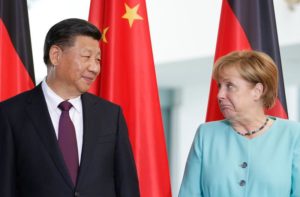
China and Germany on Wednesday defended their business ties with Iran in the face of President Donald Trump’s warning that companies trading with the Islamic Republic would be barred from the United States.
The comments from Beijing and Berlin signalled growing anger from partners of the United States, which reimposed strict sanctions against Iran on Tuesday, over its threat to penalise businesses from third countries that continue to operate there.
“China has consistently opposed unilateral sanctions and long-armed jurisdiction,” the Chinese foreign ministry said.
“China’s commercial cooperation with Iran is open and transparent, reasonable, fair and lawful, not violating any United Nations Security Council resolutions,” it added in a faxed statement to Reuters.
“China’s lawful rights should be protected.”
The German government said U.S. sanctions against Iran that have an extra-territorial effect violate international law, and Germany expects Washington to consider European interests when coming up with such sanctions.
The reimposition of U.S. sanctions followed Trump’s decision earlier this year to pull out of a 2015 deal to lift the punitive measures in return for curbs on Iran’s nuclear programme designed to prevent it from building an atomic bomb.
Tuesday’s sanctions target Iran’s purchases of U.S. dollars, metals trading, coal, industrial software and the auto sector.
Trump tweeted on Tuesday: “These are the most biting sanctions ever imposed, and in November they ratchet up to yet another level. Anyone doing business with Iran will NOT be doing business with the United States. I am asking for WORLD PEACE, nothing less!”
European countries, hoping to persuade Tehran to continue to respect the deal, have promised to try to lessen the blow of sanctions and to urge their firms not to pull out. But that has proved difficult: European companies have quit Iran, arguing that they cannot risk their U.S. business.
Among those that have suspended plans to invest in Iran are France’s oil major Total, its big carmakers, PSA and Renault, and their German rival, Daimler.
Danish engineering company, Haldor Topsoe, one of the world’s leading industrial catalyst producers, said on Wednesday it would cut around 200 jobs from its workforce of 2,700 due to the new U.S sanctions on Iran, which made it very hard for its customers there to finance new projects.
The chief executive of reinsurance group, Munich Re, said it may abandon its Iran business under pressure from the United States, but described the operation as very small.
Turkey, however, said it would continue to buy natural gas from Iran.
Agency Report
